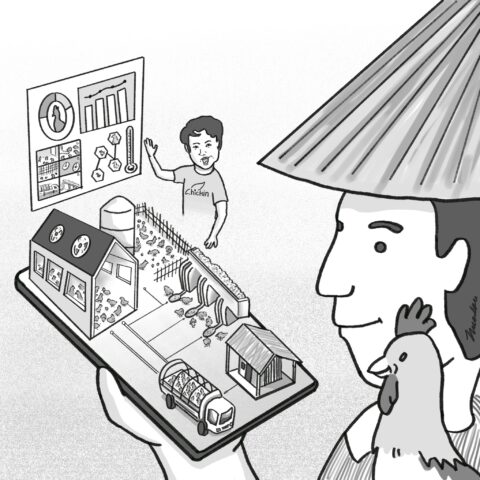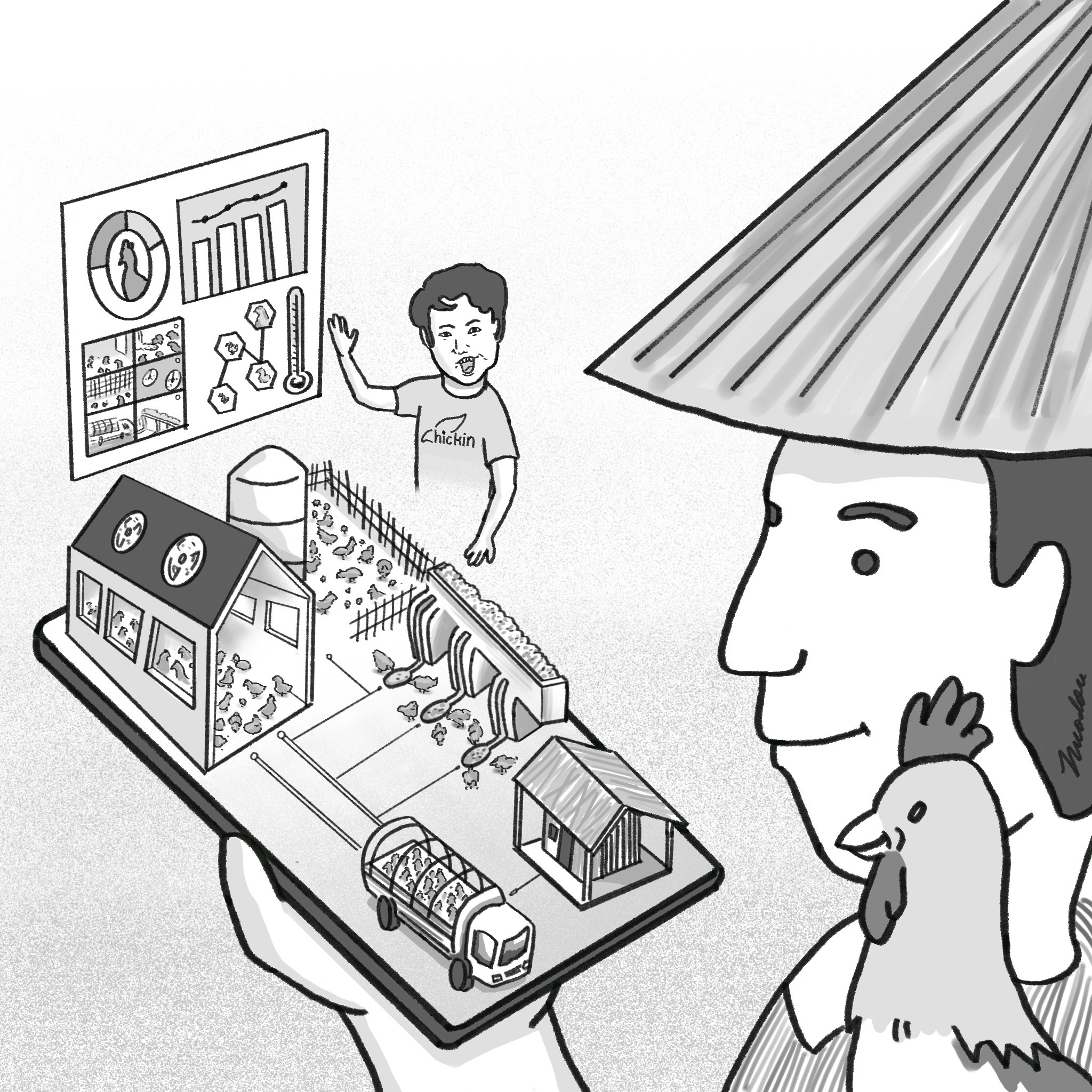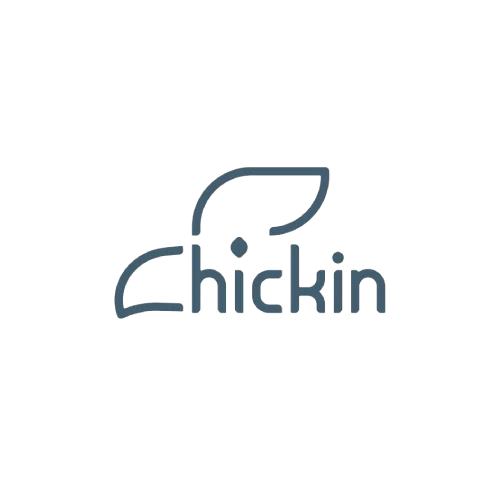
Reimagining Women’s Health: Why We Invested in Kindred Health
2 August, 2024Empowering Indonesia’s Poultry Farmers: Why We Invested in Chickin
24 October, 2024
Meet Pak Karim, a traditional Indonesian broiler farmer with over 10,000 chickens. His typical day begins with his flock of broilers—a mix of fluffy yellow chicks and sleek white adults—welcoming him with a chorus of clucks. With the help of some friends and family members, Pak Karim distributes feed, cleans the coop, and inspects each bird for illness. A limp, ruffled feather, or dull eye could indicate trouble. He quarantines the sick, administers remedies, and disposes of those beyond help.
Throughout the day, he remains vigilant, monitoring their behaviour to ensure they are eating and growing well. He adjusts the temperature and ventilation in the coop meticulously to create an ideal environment. A notebook filled with records of feed consumption and health issues is always by his side.
At month end, Pak Karim evaluates his flock, selecting the healthiest birds for market. The journey to market is a gamble; as prices fluctuate based on demand and middlemen’s access. After accounting for feed costs and losses from sick chickens, he often finds himself barely breaking even.
As the next production cycle approaches, anxiety about securing funds looms large. Being a small-scale farmer in a remote area makes credit hard to come by; lenders demand collateral that Pak Karim lacks. His dream of expanding the farm and providing a better life for his family feels increasingly distant.
Pak Karim is not alone - there are in fact tens of thousands just like him across Indonesia. The Centre for Indonesian Policy Studies estimates that the Indonesian poultry industry employs over 10% of the labour force and supplies 65% of all animal protein for the country. Despite growing consumption, Indonesia's per capita chicken consumption remains relatively low compared to other Asian countries. This indicates significant growth potential, driven by factors such as the rise of fast-food chains and government initiatives to promote protein consumption to combat growth stunting.
Chicken prices vary widely across the country and over time, driven by exogenous factors such as global energy prices, seasonality, government policies as well as natural disasters and disease outbreaks. The industry is divided into 3 segments; upstream (input production and farming), midstream (live bird trading and processing), and downstream (reaching end consumers and businesses). The upstream segment is relatively competitive and controlled by a few dominant players, while the midstream and downstream segments are highly fragmented, presenting opportunities for newcomers like Chickin.


Enter Chickin
Founded in 2020, Chickin is an Indonesian-based poultry agri-tech company dedicated to revolutionising the small-scale poultry farming industry. These farmers typically face the following challenges:
- Limited working capital: Difficulty in securing financing to expand their operations; existing contract farming arrangements are not available to the long tail of smaller farmers
- Inefficient and polluting farming practices: Lack of access to modern farming techniques and technology
- Squeezed margins: Low profit margins due to their small scale and a complex market structure with multiple intermediaries
- Price volatility: Fluctuations in live chicken prices, impacting profitability
To address these issues, Chickin offers three primary solutions:
- Contract farming: Providing financing for farm inputs (such as feed, chicks, and veterinary supplies) and offtaking produce as repayment. Chickin is able to leverage its 1) IoT solutions to lower harvest risk, 2) scale to purchase inputs at a lower cost, and 3) deep supply chain integration with the HORECAs to hedge out prices and match demand and supply according to each buyer’s specifications, thereby offering farmers more favourable and less volatile terms relative to alternatives.
- IoT solutions: An integrated suite of cameras with computer vision, humidity, temperature and environmental sensors to monitor and optimise farm operations remotely, including temperature, humidity, and feed consumption. This data-driven approach helps farmers improve efficiency, lower mortality, reduce waste, and increase yields. These sensors automatically collect environmental data from the farm, which the app analyses to provide recommendations for optimal environmental management, thereby enhancing chicken health and growth. The computer vision system identifies and monitors the physical condition of the chickens, replacing manual record-keeping with automatic data collection that is both more accurate and efficient. Transitioning from offline record systems to the app allows farmers to monitor and manage farm data in real-time, reducing recording errors and improving access to information.
- Farm management platform: What began as an app for the poultry farm community across Indonesia to share best practices, discuss poultry farming issues and monitor their chickens, has since grown into a user-friendly mobile application that provides farmers with tools for managing their farms, accessing market information, and receiving technical support.

Dedicated Trio
When we invest in operationally intensive business, we typically look out for founders with proven executional capabilities and a deep understanding of the industry, oftentimes technical founders who have done it before in their previous companies. We found these traits in the trio of experienced entrepreneurs who co-founded Chickin: Tubagus Syailendra, Ashab Al-Kahfi, and Ahmad Syaifulloh. Each co-founder brings a unique set of skills to the company, collectively driving its growth and success.
Tubagus, a seasoned entrepreneur, has a proven track record in business, having founded his first venture at the age of seventeen. His experience spans various operationally intensive industries, including fashion and waste management. Ashab offers a deep understanding of the Indonesian poultry sector, having operated his own poultry farm. His firsthand experience provides invaluable insights into the industry's challenges and opportunities. Ahmad, a technology and marketing professional, has founded multiple successful businesses in these fields, and brings along the technical capabilities required to digitally empower the poultry sector.
The co-founders' combined experience and shared passion have enabled Chickin to establish a profitable business model. By prioritising unit economics and risk management, the company successfully navigated the challenges of the 2023 chicken crisis. Chickin's operational focus and deep understanding of the Indonesian poultry market position the company for continued growth and success.
Data Defensibility and Moat
Chickin's commitment to data-driven solutions establishes a sustainable competitive advantage in the poultry industry. The company prioritises investments in technology to automate data collection, while also providing incentives that encourage farmers to input detailed data.
Leveraging extensive industry expertise, the Chickin team has developed a user-friendly platform that farmers appreciate. They continuously enhance the platform with value-added features and simplify the user experience. Additionally, Chickin's investment in computer vision and IoT technologies equips both the company and farmers with predictive analytics that were previously unavailable to small-scale poultry producers.
As Chickin scales, it becomes a data hub, gathering information across the poultry value chain. This comprehensive dataset then further enhances Chickin’s accuracy in predicting supply and demand, disease patterns, price volatility and farmers credit profile.
Endless possibilities
Chickin is poised to expand its market presence by launching its own branded poultry products. This strategic move will enable the company to play in the entire value chain, from production to retail, offering a unique advantage over competitors.
The company aims to acquire other brands and consolidate the downstream poultry market in Indonesia, positioning itself as a leading player in the industry. By leveraging its technology platform and achieving economies of scale, Chickin seeks to improve efficiency, enhance its reach, and become the tech-enabled leader of the Indonesian poultry market.
Beyond product expansion, Chickin is committed to empowering its network of farmers. By building a credit score for each farmer, the company aims to facilitate access to financial services beyond input financing. This initiative aligns with Chickin's broader mission of financial inclusion.
Broader Impact
We are proud to partner with Chickin's leadership team, which focuses not only on generating outsized and sustainable profits but also actively prioritises their impact on the environment, financial inclusion and social development. Some examples include:- Financial inclusion: Providing access to working capital for small-scale farmers, as well as mSMEs in the poultry industry across the entire value chain.
- Social impact: Increasing farmers' income through improved productivity, off-take support, and reduced costs. Using their IoT systems have allowed Chickin’s farmers to reduce chicken mortality rates by up to 50%.
- Food security: Chickin actively contribute to the government efforts to address malnutrition by democratising protein access. The Indonesian government has launched several initiatives to address the issue of chronic protein-energy deficiency in children, including supplying sources of protein to children in low-income regions. Indonesia has also classified chicken meat and eggs as crucial staples and strategic protein sources to combat human stunting.
- Environmental impact: Reducing CO2 emissions through energy-efficient practices and sustainable farming methods. Farmers using Chickin’s IoT technologies have seen around 31% in electricity savings and 18% in gasoline savings.
We look forward to supporting Tubagus, Ashab, Ahmad and their team in their journey to become a leading player in Indonesia’s poultry sector and beyond.







